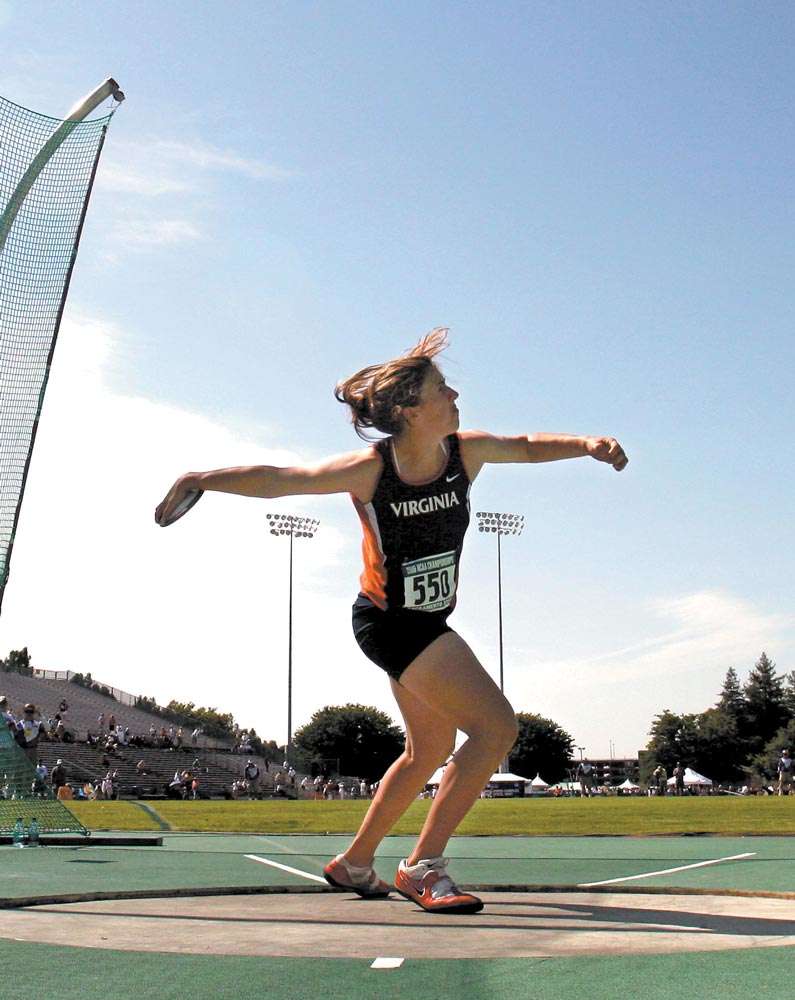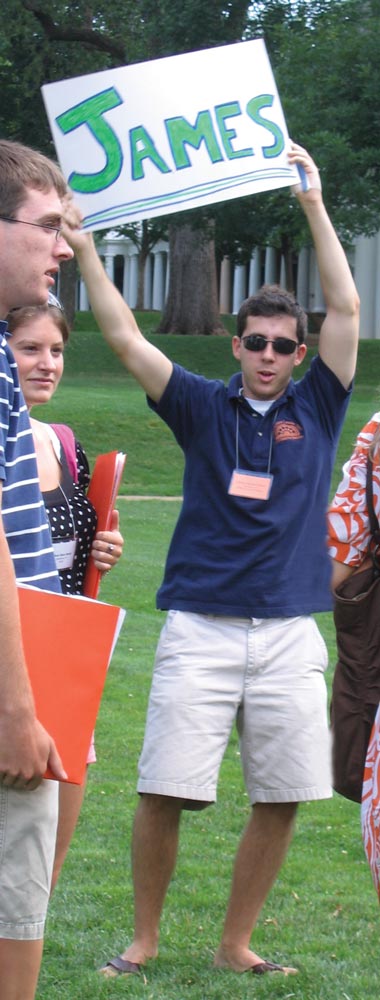Summer in C’ville
Why some students stick around
Shortly after final exams in late May, traffic thins, the pace slows and a lazy calm settles over Charlottesville. Weary students have ventured home for the prospect of summer jobs and family vacations. Save the occasional book-laden professor ambling along a brick path, or the family of tourists snapping photos of the Rotunda, the Grounds are relatively quiet and empty during these hot summer months.
Every year, a few stragglers linger behind their homebound classmates, lured by the unique opportunities that only a summer spent at UVA can offer.
The camp counselor
A horde of chatty preteens swarms around Brendan Sepulveda (Col ’08). The kids—campers at UVA’s Summer Enrichment Program—are about to attend another round of classes and it’s his job to get them enthused about the prospect. After capturing attention, he asks mischievously, “Which counselor is also a part-time deep-sea explorer?” The campers break into peals of laughter and start shouting names. Sepulveda chooses a “correct” answer, more laughter ensues and the campers depart happily.
“The silliest things will cheer them up!” he says.

Keeping morale high and tempers low is an important part of his job as head counselor of SEP, a residential summer camp for academically gifted children. Sepulveda also coordinates activities and serves as a liaison between the counselors and the campers’ worried parents. “There’s the inevitable parent phone call every night at 2 a.m.,” he says.
Campers stay in dorms, take classes and participate in recreational activities on Grounds. “SEP brings kids together who may be isolated in their schools at home. They come out of their shell,” says Sepulveda. “It’s the magic of SEP.”
This is Sepulveda’s third summer working for the mostly student-run program. He started as a counselor, working directly with a group of campers and teaching classes. Wanting more responsibility, he applied for a head counselor position. “I had no idea what I was getting into,” he jokes.
The job is difficult and intense, but Sepulveda relishes it. “It’s definitely stressful, but in some ways it’s also the easiest job I’ve ever had,” he says. “’cause it’s like being a kid again!”
Counselor Maria McCall (Col ’09) has also spent multiple summers at SEP. “I’d been a camper, which really made me fall in love with both the program and the University,” she says.
Her experience isn’t unusual. Sepulveda estimates that ten to fifteen of this year’s counselors attended SEP as campers. “It fosters an intense bond,” he says. McCall agrees. “Even on our rare time off we hang out with each other. We’re not making the best money, so the people you meet are so passionate.”
Although most of their time is spent, as Sepulveda puts it, in “the SEP bubble,” counselors are occasionally able to enjoy the Charlottesville summer. “It’s more laid-back and low-key in the summer,” he says. “It becomes the small town that C’ville would be if UVA weren’t around.”
The student-athlete
It’s shortly after 8 a.m. in mid-July and Billie-Jo Grant (Col ’07), two-time All-American athlete, is digging in the dirt. She is expertly arranging flowerbeds around her apartment complex, getting up early to avoid the midday heat. Landscaping brings in a little extra cash during the summer months.

Grant wraps up her gardening when she realizes it’s nearly time for her appointment with the dean of the foreign languages department. As president of the Student Athlete Advisory Committee, she wants to discuss ways of making the department more student-athlete friendly. Her job is made easier in the summer because “administrators, who are typically much busier during the school year, are more accessible,” she says.
After her meeting, Grant hurries to the gym for her off-season workout. She throws discus and shot put for UVA’s track and field team, twice earning All-America honors and placing sixth in the NCAA Championships. Today, she begins her training with an hour-long session in the weight room and a half-hour cardio routine. The rest of her afternoon is spent practicing technical throwing techniques.
To an outsider, Grant’s summer break does not seem like much of one at all. On top of her job, her SAAC obligations and her training, Grant is taking an independent course to work toward her master’s degree in the social foundations of education.
“I can do a lot of different things because my academic load is not as demanding,” she says. She even finds time to volunteer on the weekends—just last weekend she helped clean up a local park. “I do wish I could take off and see family and go travel, but the summer allows me to accomplish a lot,” she says.
Besides better accessibility to professors and administrators, Grant enjoys C’ville summers for her favorite spot—the Downtown Mall. “During the school year, it’s so easy to get caught up in the UVA bubble and not branch out into the community,” she says.
The graduate student
After a few administrative announcements, teaching assistant Mandy Hege pops a recent Adam Sandler movie, 50 First Dates, into the VCR and dims the classroom lights. It would appear to be the start of a summer-session goof-off class. However, her students watch the film intently, pens and notebooks in hand, analyzing the comedy as if it were laboratory data. Hege, a grad student in cognitive psychology, teaches PSYC 402: Portrayals of Amnesia in Cinema, a course that investigates how amnesia is represented in popular films compared to current empirical research on amnesia. This week’s lecture focuses on the rehabilitation of people with memory disorders. Her students, mostly fourth-year psych majors, examine the strategies used by the movie’s main character to cope with her memory impairment.

The class, which meets every weekday for two and half hours, will use the movie as a basis for discussion for the rest of the week. “I love teaching,” says Hege, who generally teaches one course per semester. “It’s definitely what I want to do when I finally get out of grad school.”
After class, Hege hops in her car and heads over to Panera Bread in Barracks Road Shopping Center. At a small table in the back corner, she sets up a makeshift office. She prepares notes for the next day’s class, grades papers, scans data from her latest research and catches up on some reading.
During the summer, when her schedule offers a little more flexibility, Hege spends the majority of her time off Grounds, working in cafes or studying outside.
“I only go to my on-Grounds office in Gilmer about once a week,” she says. “It’s really dreary and two floors below ground level. I don’t want to be there at all.”
While her relaxed summer schedule allows her to catch the occasional concert, there is one major drawback: she has a hard time running lab experiments. Her dissertation—a study of the effect of mood on the likelihood that people will make certain memory errors—requires hard data. During the school year, undergraduate students participate for class credit, but the summers offer a vastly reduced pool of potential participants.
While day-to-day life doesn’t change much for most grad students during the summer, Hege feels and appreciates a difference. “Charlottesville just has a much more open feel,” she says.
The orientation leader
Imagine you are responsible for shaping an incoming student’s initial impressions of UVA. What would you say? How would you put them at ease?

Sound like high pressure? Welcome to the job of a summer orientation leader—students whose sole objective is to lead an experience that will help define first-years’ opinions about the place where they will spend the next four years.
All incoming first-year and transfer students attend one of eleven summer orientations, a two-day event designed to acclimate them to Grounds and get them registered for fall classes.
“I had a great time at my orientation,” says James Allman-Gulino (Col ’08), who was selected from more than 100 applicants to serve as one of this summer’s leaders. “It’s a very ‘UVA experience,’ so I’m hoping it will bring me even closer to the school.”
For Diamond Bruner (Col ’09), another orientation leader, it already has. “I learned so much about the University” in the traning session, she says. “I kept thinking, ‘I wish I’d known this as a first-year!’”
That’s a huge part of an orientation leader’s job: sharing his or her own experiences, regrets and suggestions with incoming students to help them choose their classes and navigate University requirements.
They also dispense nonacademic advice. During these sessions, notably free of parents or teachers, incoming students can ask about anything. “They’ll ask about sex or alcohol—stuff they don’t want to talk about in front of ‘adults,’” says Bruner.
Leaders are mindful of not relying too heavily on their own experience so they won’t isolate anyone. “I definitely try to stress that there are all kinds of entities at UVA,” Allman-Gulino says.
The leaders themselves received a lesson in tolerance when they were thrown together as a group. “The training helped because it forced us to relate to people from different UVA communities,” Bruner says.
They bond further from the shared experience of living in Hereford—dorms farthest from Central Grounds. “It’s difficult, trying to climb up that hill with your huge bag of course-advising materials,” Bruner says. “But it grows on you. I like the quiet.”
The calm of Charlottesville in the summer is appreciated after the excitement of an orientation. After maintaining a constant cheeriness for the duration of each session—whether bursting into classes singing the “Good Old Song” or running around the Lawn trying to excite the students—it’s nice to just relax.